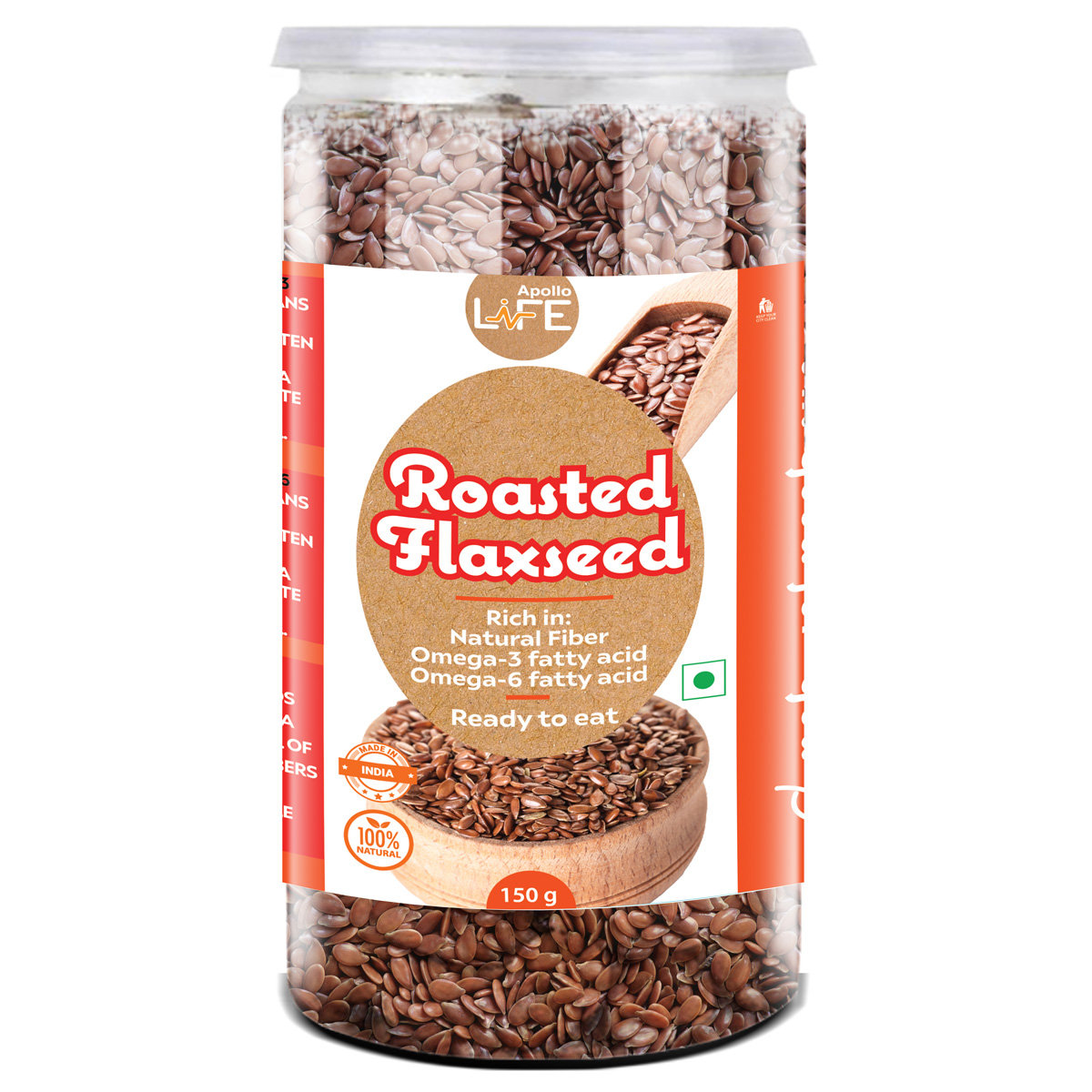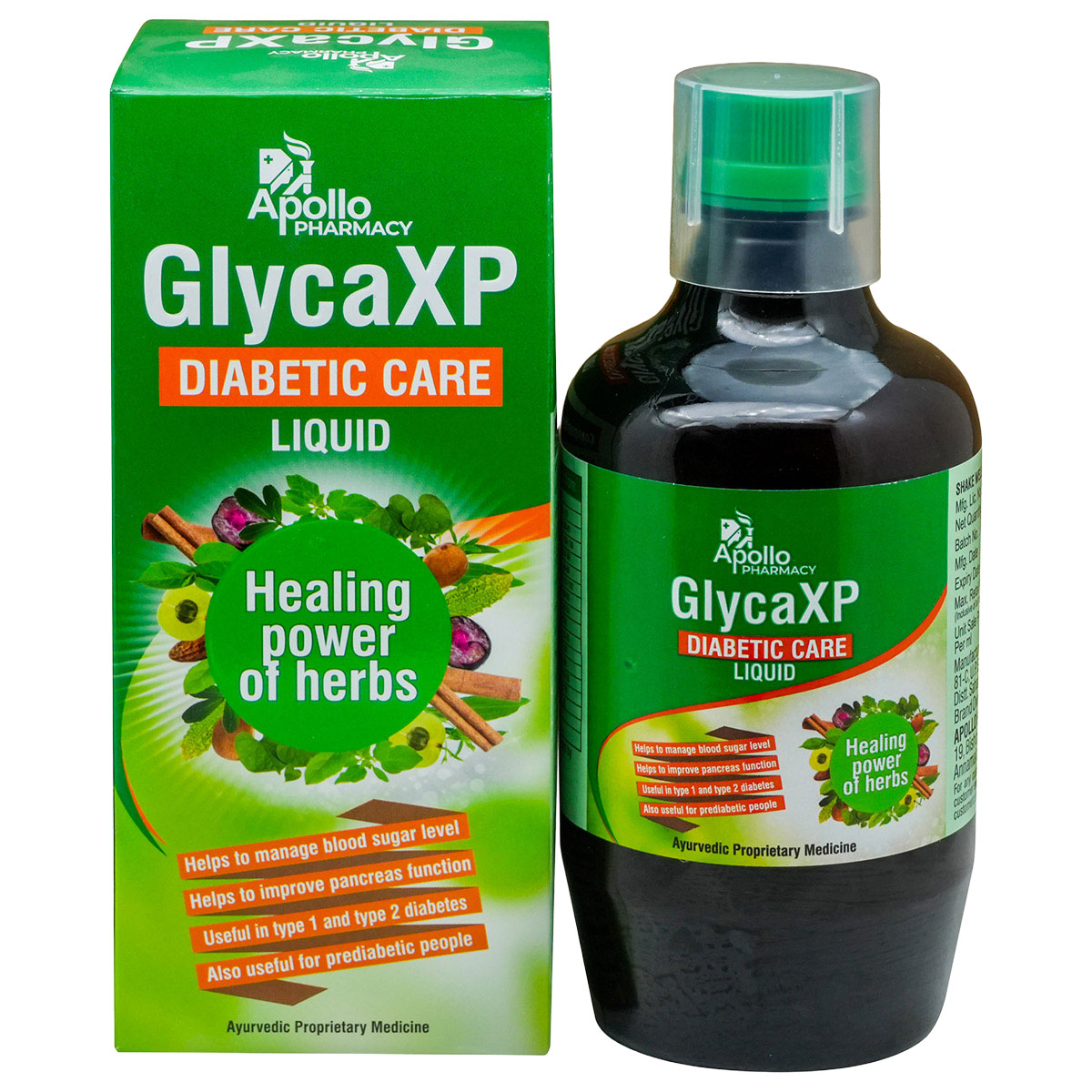Glybovin 1.25 Tablet 10's
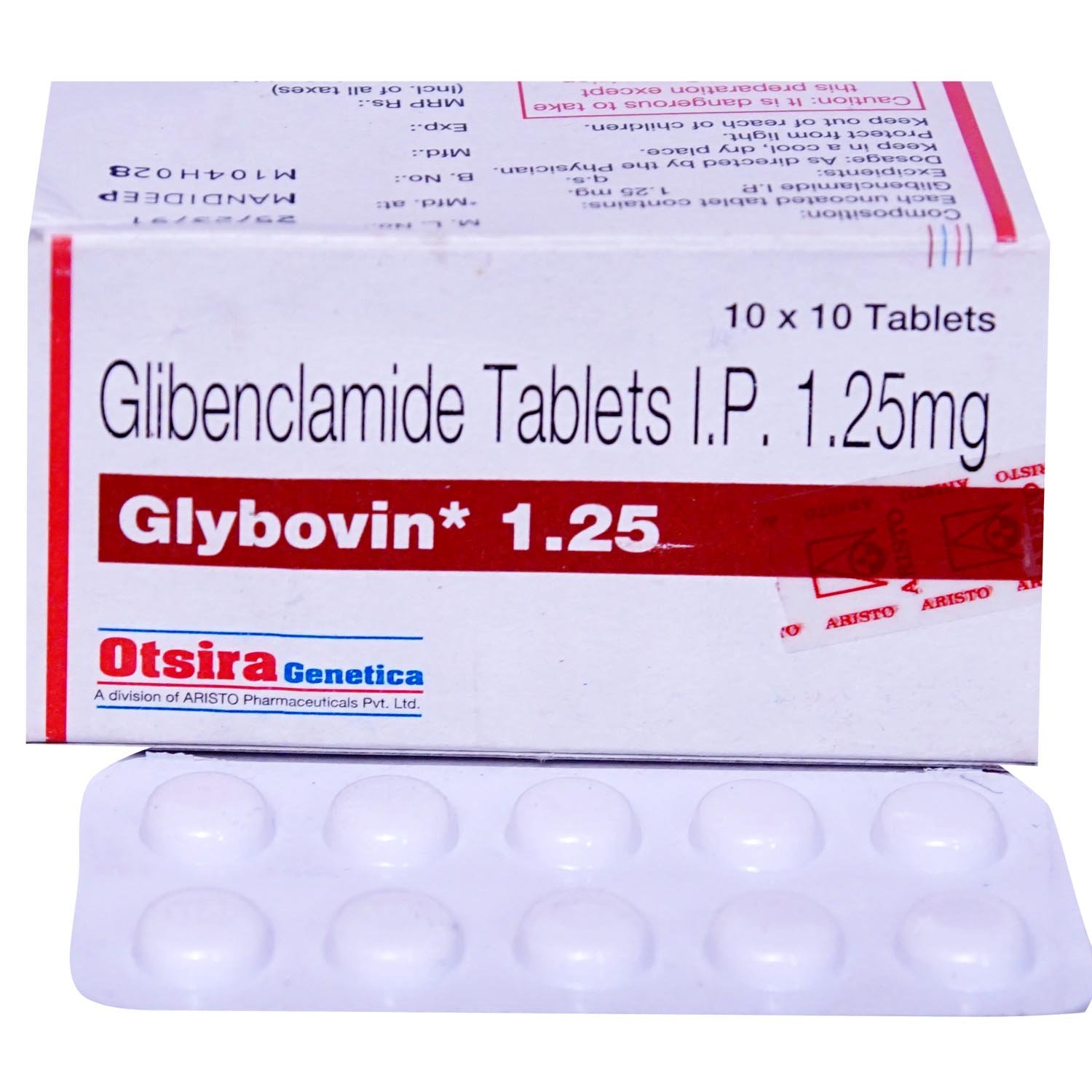
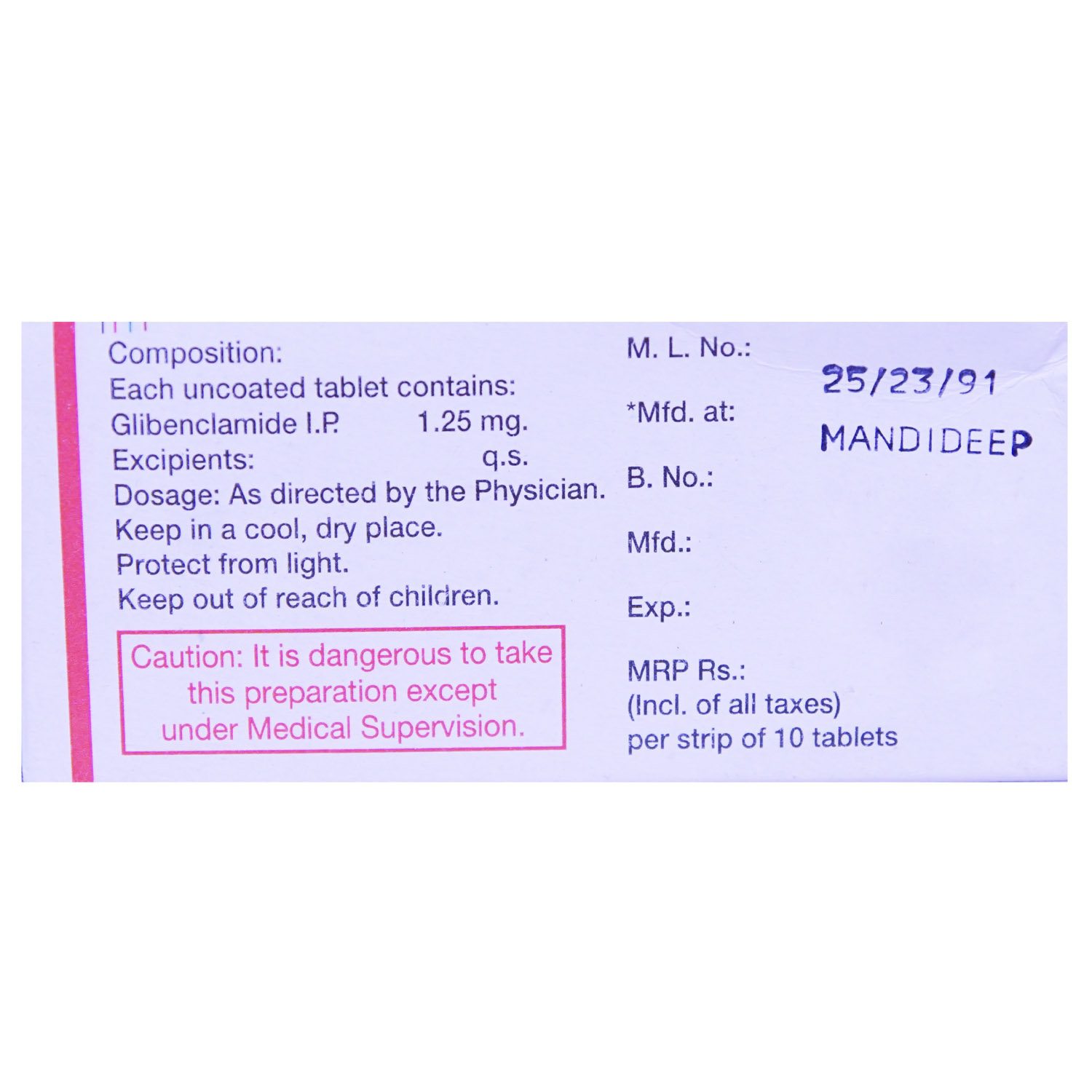
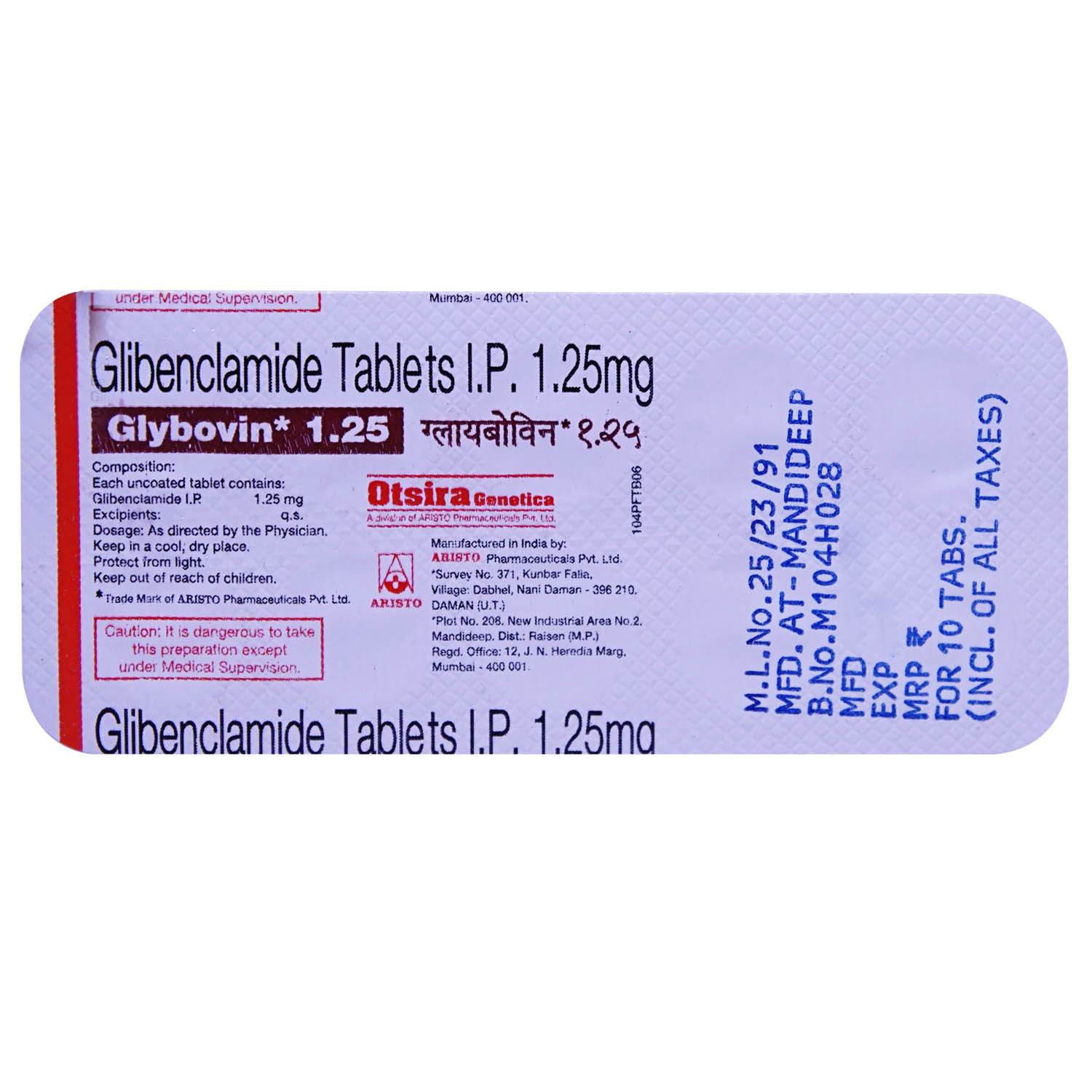
MRP ₹5
(Inclusive of all Taxes)
₹0.6 Cashback (12%)
Know Your Delivery Time
Provide Delivery Location

Secure Payment

India's Most Trusted Pharmacy

Genuine Products
Composition :
Manufacturer/Marketer :
Consume Type :
Return Policy :
Expires on or after :
About Glybovin 1.25 Tablet
Glybovin 1.25 Tablet is used to treat type-2 diabetes. Type 2 diabetes is a chronic or lifelong condition affecting how your body processes glucose. People with type 2 diabetes either do not produce enough insulin, or if the insulin is produced, it cannot perform its function in the body (insulin resistance). Thus, the blood glucose level increases and symptoms such as frequent urination increased thirst and increased hunger.
Glybovin 1.25 Tablet contains Glibenclamide, which acts by increasing the amount of insulin released by the pancreas. It stimulates insulin secretion from the pancreas and decreases blood sugar levels. In a nutshell, it prevents blood glucose levels from rising to very high levels, thus keeping your diabetes under control. Glybovin 1.25 Tablet shows optimum effects when taken along with healthy lifestyle changes like weight loss, regular exercise, a healthy diet, etc.
Glybovin 1.25 Tablet should be taken with food to avoid an upset stomach .Glybovin 1.25 Tablet should be taken at the same time of the day each time for the best results. Your doctor will decide what dose should be taken for better advice, and it can change timely depending upon your condition. A common side effect of Glybovin 1.25 Tablet is low blood glucose levels characterized by dizziness, sweating, palpitations, hunger pangs, dry mouth, skin, etc. To avoid hypoglycaemia, you should not miss meals and should carry some form of sugar along with you. Other side effects include taste change, nausea, diarrhoea, stomach pain, headache, and upper respiratory symptoms.
Glybovin 1.25 Tablet should not be stopped even if you feel better without consulting your doctor as the sugar levels change. If you stop taking Glybovin 1.25 Tablet abruptly, it may increase your sugar levels, which could further increase the risk of eyesight loss (retinopathy), kidney (nephropathy) and nerve damage (neuropathy). Glybovin 1.25 Tablet should not be taken if you have severe kidney or liver disease or have a diabetic coma. Please inform your doctor if you have had liver, kidney or heart disease, are pregnant or planning to get pregnant, are breastfeeding, or have a blood disease called G6PD-deficiency anaemia or heart disease. Mental alertness may be altered due to low or high blood sugar when Glybovin 1.25 Tablet is not taken regularly, which may affect your ability to drive or operate machinery.
Uses of Glybovin 1.25 Tablet
Glybovin 1.25 Tablet used in the treatment of Type 2 diabetes mellitus. The detailed uses of Glybovin 1.25 Tablet are as follows:
- Treatment of Type 2 Diabetes: Glybovin 1.25 Tablet is used to treat Type 2 Diabetes by managing blood sugar levels in adults.
- Regulating Insulin: Glybovin 1.25 Tablet works by regulating insulin release, helping the body to effectively use insulin and manage blood sugar levels.
- Lowering Blood Sugar: Glybovin 1.25 Tablet helps to lower blood sugar levels, thereby reducing the risk of diabetes-related complications.

Have a query?
Directions for Use
- Take Glybovin 1.25 Tablet with food or as advised by your doctor.
- Follow your doctor’s instructions on the dosage and timing of this medication to ensure safe and effective use.
- Swallow Glybovin 1.25 Tablet as a whole with a glass of water.
- Do not crush, chew, or break it.
Medicinal Benefits
Glybovin 1.25 Tablet contains Glibenclamide, a 'sulfonylurea', which decreases raised blood sugar levels by stimulating insulin release from the beta cells located in the pancreas (insulin-secreting organ). In a nutshell, it prevents the blood glucose levels from rising to very high levels, thus keeping your diabetes under control. Glybovin 1.25 Tablet shows optimum effects when taken along with healthy lifestyle changes like weight loss, regular exercise, healthy diet, etc.
How Glybovin 1.25 Tablet Works
Storage
- Maintain good hygiene by washing with lukewarm water regularly.
- Moisturize your skin to keep it hydrated.
- Practice wearing loose-fitting clothes made from breathable fabrics.
- Apply cool compresses by using a damp cloth on the rashes for few minutes.
- Avoid scratching on rashes to prevent infections.
- Consider covering the rashes by using a gauge.
- Take cool baths and add baking soda or oatmeal bath products to ease itching.
What if I have taken an overdose of Glybovin 1.25 Tablet
Drug Warnings
Some diabetic patients taking Glybovin 1.25 Tablet may develop a rare but serious condition called lactic acidosis. In this condition, there is too much lactic acid accumulated in the blood. So, your liver and kidney proper functioning is required to eliminate excess lactic acid from the blood. If you are allergic (hypersensitive) to Glibenclamide or any ingredient of Glybovin 1.25 Tablet , have severe liver or kidney problems, have severe thyroid or adrenal gland problems, have ever had a diabetic coma, Glybovin 1.25 Tablet should not be taken. Consult your doctor and take only if prescribed under medical supervision. Glybovin 1.25 Tablet shows optimum effects when taken along with healthy lifestyle changes like weight loss, regular exercise, healthy diet, etc.
Drug-Drug Interactions
Drug-Drug Interactions
Login/Sign Up
Co-administration of Norfloxacin with Glybovin 1.25 Tablet may sometimes affect blood glucose levels. Both high blood glucose and, less frequently, low blood glucose have been reported.
How to manage the interaction:
Although there is a possible interaction, Glybovin 1.25 Tablet can be taken with Norfloxacin if prescribed by the doctor. Consult the prescriber if you experience symptoms of low blood sugar such as nervousness, confusion, headache, dizziness, drowsiness, tremor, nausea, hunger, weakness, perspiration, palpitation, and rapid heartbeat or symptoms of high blood sugar such as increased urination, increased thirst, and increased hunger. Maintaining blood glucose levels is advised. Do not discontinue any medications without consulting a doctor.
Co-administration of Glybovin 1.25 Tablet with Grepafloxacin can sometimes affect blood glucose levels. Both hyperglycemia (high blood glucose) and, less frequently, hypoglycemia (low blood glucose) have been reported.
How to manage the interaction:
Co-administration of Glybovin 1.25 Tablet with Grepafloxacin can possibly result in an interaction, but it can be taken if a doctor has advised it. If you experience any of these symptoms - severe infections, headaches, dizziness, drowsiness, confusion, trembling, nausea, hunger, weakness, fast heartbeat, or excessive thirst - it's best to call a doctor right away. Do not discontinue any medications without consulting a doctor.
Co-administration of Ofloxacin with Glybovin 1.25 Tablet can sometimes affect blood glucose levels. Both high blood glucose and, less frequently, low blood glucose have been reported.
How to manage the interaction:
Although there is a possible interaction, Glybovin 1.25 Tablet can be taken with Ofloxacin if prescribed by the doctor. Consult the prescriber if you experience symptoms of low blood sugar such as nervousness, confusion, headache, dizziness, drowsiness, tremor, nausea, hunger, weakness, perspiration, palpitation, and rapid heartbeat or symptoms of high blood sugar such as increased urination, increased thirst, and increased hunger. Maintaining blood glucose levels is advised. Do not discontinue the medications without consulting a doctor.
Co-administration of Sparfloxacin can sometimes affect blood glucose levels. Both high blood glucose and, less frequently, low blood glucose have been reported.
How to manage the interaction:
Although there is a possible interaction, Glybovin 1.25 Tablet can be taken with sparfloxacin if prescribed by the doctor. Consult the prescriber if you experience symptoms of low blood sugar such as nervousness, confusion, headache, dizziness, drowsiness, tremor, nausea, hunger, weakness, perspiration, palpitation, and rapid heartbeat or symptoms of high blood sugar such as increased urination, increased thirst, and increased hunger. Do not discontinue the medications without consulting a doctor.
Co-administration of Miconazole with Glybovin 1.25 Tablet may increase the blood levels and effects of Glybovin 1.25 Tablet leading to low blood glucose levels.
How to manage the interaction:
Although there is a possible interaction, Glybovin 1.25 Tablet can be taken with miconazole if prescribed by the doctor. Consult the prescriber if you experience symptoms of low blood sugar such as nervousness, confusion, headache, dizziness, drowsiness, tremor, nausea, hunger, weakness, perspiration, palpitation, and rapid heartbeat. Monitoring of blood glucose levels is advised. Do not discontinue the medications without consulting a doctor.
Co-administration of Glybovin 1.25 Tablet with Cinoxacin can sometimes affect blood glucose levels. Both hyperglycemia (high blood glucose) and, less frequently, hypoglycemia (low blood glucose) have been reported.
How to manage the interaction:
Co-administration of Glybovin 1.25 Tablet with Cinoxacin can possibly result in an interaction, but it can be taken if a doctor has advised it. It's important to keep an eye on your urination and if you notice any changes, let your doctor know. If you experience any of these symptoms - high or low blood sugar, severe infections, headaches, dizziness, confusion, or feeling shaky, make sure to call a doctor right away. Do not discontinue any medications without consulting a doctor.
When Glybovin 1.25 Tablet is taken with Enoxacin, it may affect the blood glucose levels which may leads to hypoglycemia or hyperglycemia.
How to manage the interaction:
There may be a possibility of interaction between Glybovin 1.25 Tablet and Enoxacin, but it can be taken if prescribed by a doctor. If you notice any symptoms like headache, dizziness, drowsiness, nervousness, confusion, tremor, nausea, hunger, weakness, perspiration, palpitation, and rapid heartbeat, increased thirst, increased hunger, and increased urination. Do not stop using any medications without talking to a doctor.
Co-administration of Glybovin 1.25 Tablet with Ciprofloxacin may affect blood glucose levels leading to high blood glucose levels, and less frequently low blood glucose levels.
How to manage the interaction:
Although there is a possible interaction, Glybovin 1.25 Tablet can be taken with Ciprofloxacin if prescribed by the doctor. Consult the doctor if you experience symptoms such as headache, dizziness, drowsiness, nervousness, confusion, tremor(shaking), nausea, hunger, weakness, sweating, rapid heartbeat, increased thirst, increased hunger, and increased urination. Do not discontinue the medications without consulting a doctor.
Co-administration of Glybovin 1.25 Tablet with Fluconazole may cause an increase in the blood levels and effects of Glybovin 1.25 Tablet leading to low blood sugar levels.
How to manage the interaction:
Although there is a possible interaction, Glybovin 1.25 Tablet can be taken with Fluconazole if prescribed by the doctor. Consult the prescriber if you experience symptoms of low blood sugar such as nervousness, confusion, headache, dizziness, drowsiness, tremor, nausea, hunger, weakness, perspiration, palpitation, and rapid heartbeat. Monitoring of blood glucose levels is advised. Do not discontinue the medications without consulting a doctor.
Co-administration of Levofloxacin with Glybovin 1.25 Tablet may affect blood glucose levels.
How to manage the interaction:
Although there is a possible interaction, Glybovin 1.25 Tablet can be taken with levofloxacin if prescribed by the doctor. Consult the prescriber if you experience nervousness, confusion, headache, dizziness, drowsiness, tremors, nausea, hunger, weakness, perspiration, pulse, rapid heartbeat, increased urination, increased thirst, and increased hunger. Monitoring of blood glucose levels is advised. Do not discontinue the medications without consulting a doctor.
Drug-Food Interactions
Drug-Food Interactions
Login/Sign Up
Diet & Lifestyle Advise
- Fill your half plate with starchy veggies, a quarter with proteins and a quarter with whole grain.
- Eat at regular intervals. Do not take a long gap between a meal or snack.
- Monitor your blood sugar level regularly, especially when there are a lot of fluctuations.
- Invest at least 150 min of moderate-intensity physical activity and 15 minutes of high-intensity exercise every week.
- Lose weight gradually to achieve a healthy body mass index (18.5 to 24.9).
- Replace refined carbohydrates containing whole-grain foods and increase intake of fruits and veggies and other fiber-enriched foods.
- Reduce intake of saturated fat (or hidden fats) in food like chips, crisps, pastries, biscuits, and samosas. Choose omega 3 fatty acid-containing oils for daily cooking. You may use palm oil, mustard oil, groundnut oil, rice bran oil and safflower oil for frying.
- Do not take stress as it may elevate your blood sugar level. You may adopt stress management techniques like mindfulness, yoga, or meditation to control stress-related blood sugar changes.
- Opt for low-fat dairy products (low-fat yogurt, fat-free milk, and cheese, etc.).
- Keep your blood pressure as normal (120/80) as possible as it reduces the risk of cardiovascular diseases in diabetes patients.
Habit Forming
Therapeutic Class
All Substitutes & Brand Comparisons
Alcohol
Unsafe
Glybovin 1.25 Tablet should not be taken until prescribed if you are taking alcohol. Taking Glybovin 1.25 Tablet with alcohol can cause hypoglycemia. So, keep your doctor informed if you drink alcohol.
Pregnancy
Caution
As the data around the use of Glybovin 1.25 Tablet in pregnant women is limited, the use of Glybovin 1.25 Tablet in pregnancy is restricted.It is highly recommended to consult your doctor before taking this drug in case you are pregnant.
Breast Feeding
Caution
Tell your doctor if you are breastfeeding. Do not breastfeed while you are taking Glybovin 1.25 Tablet without advice from your doctor.
Driving
Caution
Glybovin 1.25 Tablet may cause hypoglycemia (low blood sugar levels) whose symptoms include unusual sleepiness, shivering, palpitations, sweating, etc. This may affect your ability to drive. Use caution while driving or doing anything that requires concentration or mental alertness.
Liver
Caution
Glybovin 1.25 Tablet to be taken with caution, especially if you have a history of liver diseases/conditions. The dose may have to be adjusted by your doctor, depending on your liver function tests.
Kidney
Unsafe
Glybovin 1.25 Tablet is unsafe, especially if you have a history of kidney diseases/conditions.
Children
Unsafe
Glybovin 1.25 Tablet is not recommended for children below the age of 18 years. The safety and effectiveness of Glybovin 1.25 Tablet have not been established in children due to limited evidence. So, only take Glybovin 1.25 Tablet if the doctor has prescribed you.
Heart
Please consult your doctor before using Glybovin 1.25 Tablet if you have pre-existing heart problems. Your doctor will prescribe Glybovin 1.25 Tablet if the benefits outweigh the risks.
Geriatrics
Consult your doctor
Please consult a doctor before administering Glybovin 1.25 Tablet to geriatric patients. Your doctor will prescribe Glybovin 1.25 Tablet if the benefits outweigh the risks.
FAQs
Glybovin 1.25 Tablet is used to treat type-2 diabetes, a chronic or lifelong condition affecting how the body processes glucose.
Glybovin 1.25 Tablet contains Glibenclamide, which increases the amount of insulin released by the pancreas. It stimulates insulin secretion from the pancreas and decreases blood sugar levels. In a nutshell, it prevents blood glucose levels from rising to very high levels, thus keeping your diabetes under control.
Yes, Glybovin 1.25 Tablet can cause constipation. Eat a proper well-balanced diet and drink plenty of fluid to avoid it.
Yes, Glybovin 1.25 Tablet is known to cause an upset stomach if taken empty stomach. So, it should be preferably taken with a meal or just after a meal to avoid an upset stomach.
No, Glybovin 1.25 Tablet is only prescribed for the treatment for the type 2 diabetes along with a healthy diet and lifestyle. It should not be taken for the treatment of type 1 diabetes.
Hypoglycemia refers to low blood sugar levels. The symptoms of hypoglycemia (low blood sugar) include sweating, feeling shaky or anxious, looking pale, feeling hungry, feeling dizzy, and feeling that your heart is pounding (palpitations). Glybovin 1.25 Tablet can cause hypoglycemia. Hypoglycemia can occur if you miss or delay your food, drink alcohol, over-exercise or take other antidiabetic medicine along with Glybovin 1.25 Tablet . People with diabetes are advised to keep a quick sugar source like glucose tablets, honey or fruit juice.
Country of origin
Manufacturer/Marketer address
Customers Also Bought
Disclaimer
Author Details
We provide you with authentic, trustworthy and relevant information
Buy best Diabetics products by
Torrent Pharmaceuticals Ltd
Intas Pharmaceuticals Ltd
Eris Life Sciences Ltd
Lupin Ltd
Micro Labs Ltd
Sun Pharmaceutical Industries Ltd
Mankind Pharma Pvt Ltd
Alkem Laboratories Ltd
Lloyd Healthcare Pvt Ltd
Cipla Ltd
Macleods Pharmaceuticals Ltd
Abbott India Ltd
Primus Remedies Pvt Ltd
Glenmark Pharmaceuticals Ltd
Aristo Pharmaceuticals Pvt Ltd
Dr Reddy's Laboratories Ltd
USV Pvt Ltd
La Renon Healthcare Pvt Ltd
Wockhardt Ltd
Emcure Pharmaceuticals Ltd
Fusion Health Care Pvt Ltd
Ajanta Pharma Ltd
Ipca Laboratories Ltd
Alembic Pharmaceuticals Ltd
Corona Remedies Pvt Ltd
East West Pharma India Pvt Ltd
Hbc Life Sciences Pvt Ltd
Eswar Therapeutics Pvt Ltd
Zydus Healthcare Ltd
Alteus Biogenics Pvt Ltd
Elbrit Life Sciences Pvt Ltd
Mitoch Pharma Pvt Ltd
Medley Pharmaceuticals Ltd
Ranmarc Labs
Sinsan Pharmaceuticals Pvt Ltd
Msn Laboratories Pvt Ltd
Nirvana India Pvt Ltd
Tas Med India Pvt Ltd
Akumentis Healthcare Ltd
Arkas Pharma Pvt Ltd
Leeford Healthcare Ltd
Novo Nordisk India Pvt Ltd
Unison Pharmaceuticals Pvt Ltd
Sanofi India Ltd
Acmedix Pharma Llp
Q Check Pharmaceuticals
Blue Cross Laboratories Pvt Ltd
Xemex Life Sciences
Neucure Lifesciences Pvt Ltd
Alvio Pharmaceuticals Pvt Ltd
Anthem Bio Pharma
Spectra Therapeutics Pvt Ltd
Sydmen Life Sciences Pvt Ltd
Aareen Healthcare Pvt Ltd
Diacardus Pharmacy Pvt Ltd
Jubilant Lifesciences Ltd
Systopic Laboratories Pvt Ltd
Talent India Pvt Ltd
Edoc Life Sciences Pvt Ltd
Stature Life Sciences Pvt Ltd
Franco Indian Pharmaceuticals Pvt Ltd
Panacea Biotec Ltd
Sanz Pharmaceuticals
Shrrishti Health Care Products Pvt Ltd
Verse Lifesciences
Akesiss Pharma Pvt Ltd
Hicxica Formulations Pvt Ltd
Indoco Remedies Ltd
Lividus Pharmaceuticals Pvt Ltd
Capital Pharma
Elinor Pharmaceuticals (P) Ltd
Saan Labs
Zydus Cadila
Biocon Ltd
Eli Lilly and Company (India) Pvt Ltd
Lippon Pharma Pvt Ltd
MERAKI HEALTH
Remedy Life Sciences Pvt Ltd
Koye Pharmaceuticals Pvt Ltd
Morepen Laboratories Ltd
Atos Lifesciences Pvt Ltd
Eysys Pharmaceutical Pvt Ltd
MEDICAMEN BIOTECH LTD
Azkka Pharmaceuticals Pvt Ltd
Converge Biotech Pvt Ltd
Erinyle Health Care Pvt Ltd
Elder Pharmaceuticals Ltd
FDC Ltd
Heal (India) Laboratories Pvt Ltd
Knoll Healthcare Pvt Ltd
Jarun Pharmaceuticals Pvt Ltd
Opsis Care Lifesciences Pvt Ltd
Vasu Organics Pvt Ltd
Wallace Pharmaceuticals Pvt Ltd
CADOMAX HEALTHCARE PVT. LTD
Cadomed Pharmaceuticals India Pvt Ltd
Daylon healthcare pvt Ltd
Lincoln Pharmaceuticals Ltd
Medicure Life Sciences Pvt Ltd
Olcare Laboratories Pvt Ltd



